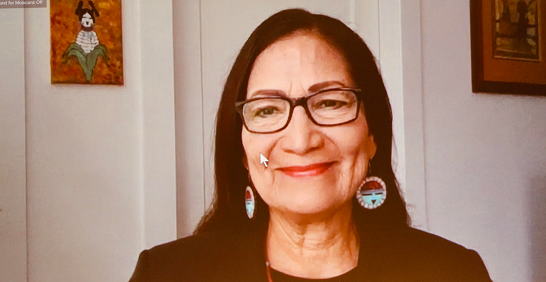
- Details
- By Levi Rickert
WASHINGTON — The White House Tribal Nations Summit began last Wednesday morning. During the afternoon the attendees heard from President Joe Biden and Vice President Kamala Harris in separate appearances.

Interior Secretary Deb Haaland (Laguna Pueblo) was diagnosed with Covid-19 on Monday was not able to attend in-person. In a press release on Monday, the Interior Department said Secretary Haaland would abide by CDC guidelines to isolate. However, she participated at the summit virtually. President Biden was introduced by Assistant Secretary Bryan Newland (Bay Mills Indian Community) due to Secretary Haaland's in-person absence.
Some 400 tribal leaders and leaders of national Native American organizations were in attendance.
Navajo Nation President Buu Nygren, who was inaugurated on January 10, 2023, attended his first White House tribal summit. On Thursday, the Department of Energy announced two new MOUs signed by several federal deapartments and agenices to create structured support for the Hopi Tribe and amends the existing Navajo Nation MOU with federal agencies to help both tribes and their communities transition to clean energy.

Navajo Nation President Buu Nygren
Photos by Levi Rickert for Native News Online
https://nativenewsonline.net/currents/photos-from-the-2023-white-house-tribal-nations-summit#sigProId9ca7d3b49b
More Stories Like This
Native News Weekly (August 25, 2024): D.C. BriefsUS Presidents in Their Own Words Concerning American Indians
Next on Native Bidaské: Preserving Indian Health with A.C. Locklear
Hozhonigo Institute Helps Drive $34.5M in Grant Pipeline for Tribal Communities
Torres, LaMalfa Lead Push to Safeguard Culturally Important Tribal Seed Varieties
Help us defend tribal sovereignty.
At Native News Online, our mission is rooted in telling the stories that strengthen sovereignty and uplift Indigenous voices — not just at year’s end, but every single day.
Because of your generosity last year, we were able to keep our reporters on the ground in tribal communities, at national gatherings and in the halls of Congress — covering the issues that matter most to Indian Country: sovereignty, culture, education, health and economic opportunity.
That support sustained us through a tough year in 2025. Now, as we look to the year ahead, we need your help right now to ensure warrior journalism remains strong — reporting that defends tribal sovereignty, amplifies Native truth, and holds power accountable.
 The stakes couldn't be higher. Your support keeps Native voices heard, Native stories told and Native sovereignty defended.
The stakes couldn't be higher. Your support keeps Native voices heard, Native stories told and Native sovereignty defended.
Stand with Warrior Journalism today.
Levi Rickert (Potawatomi), Editor & Publisher


